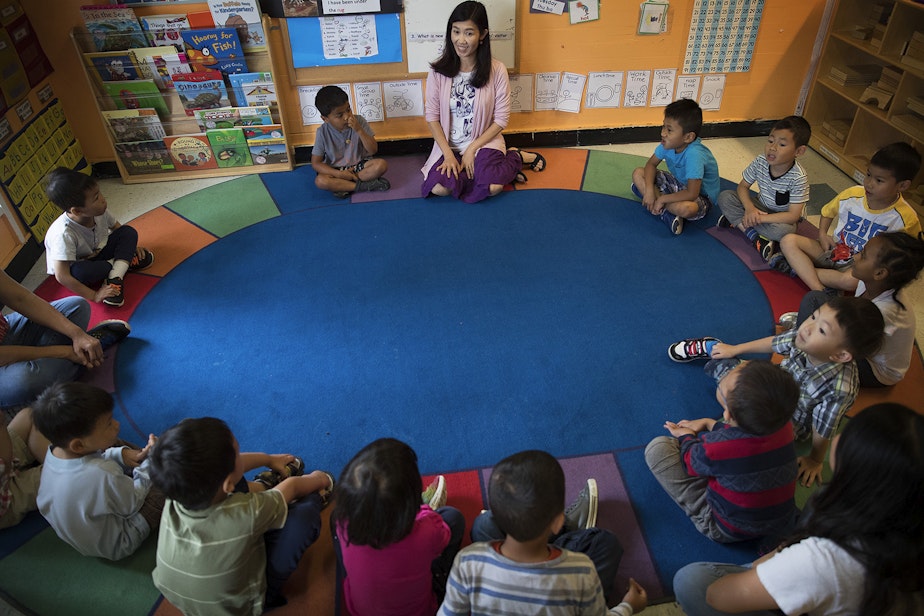This is why the League of Women Voters is urging 'no' vote on Seattle education levy

- Seattle voters will decide next week on an approximately $620 million education levy.
- League of Woman Voters is urging a "no" vote, worried some of the money could end up with charter schools.
Seattle is a city where schools levies usually sail through.
But some education advocates take issue with Proposition 1, also known as the Families, Education, Preschool and Promise Plan.
The centerpiece of the measure is preschools.
"It's smart for us to make certain that the next generation is ready and prepared to lead and to serve," said Tim Burgess, the former city council member and former interim mayor. He’s sometimes called the godfather of pre-K for helping craft the public preschool pilot Seattle voters approved in 2014.
"We have a large number of students, primarily students living in poverty, and students of color, who are behind," Burgess said. "For example, half of our kindergartners show up at the kindergarten door for the first time not ready to learn through no fault of their own."
Sponsored
There are now 1,201 kids in the Seattle Preschool Program. Proposition 1 aims to serve 2,500 children annually. It would run for seven years, and combines the preschool levy with another expiring levy — the Families and Education Levy — which provides academic supports and wraparound services, like reading specialists and student health centers, to Seattle Public Schools.
There’s also a new component in this levy – free community college for Seattle’s public high school graduates.
"I don't think there is a dollar we can spend more wisely than to invest in our kids, whether it's preschool, or K-12, or two years of free community college," Burgess said.
"It's smart for us to make certain that the next generation is ready and prepared to lead and to serve.”
Heather Kelly, board member of the League of Women Voters of Seattle-King County, agreed with that on principle.
Sponsored
"Prop 1 is appealing on so many levels. I mean, who doesn't want subsidized preschool for low income families?" Kelly said. "Who doesn't want high school students to feel like they can count on community college?"
Kelly said despite that, the League is urging a “no” vote on the levy.
"The problem, from our standpoint, is just the vague language around charter schools — whether levy funds would would go to charter schools or not is a question that we haven't gotten a clear answer on,” she said.
The League opposes public funds going to charter schools. Its board has also voiced concern that Proposition 1 could erode voter support for two critical Seattle School District capital and operations levies coming in February.
Burgess said that’s unlikely, given that no education levy has failed in Seattle in decades.
Sponsored
But Kelly said if voters did reject Proposition 1, the city would have time to make the changes she’d like to see and put it back on the ballot in April – without any loss of funding to schools.
"That's the beauty of a levy, in a lot of ways, is that it can be responsive to the voters," Kelly said.
Shelby Parsons, who recently completed a master's in education policy at the University of Washington, has closely examined school levy dollars. Parsons worked with a research team to examine the funding of the Seattle Preschool Program, which makes up the bulk of the levy.
One issue they found is that the city plan would cost more than double the $12,000 market rate for preschool tuition.
"The area that we find concerning is we have this large levy, and we could be serving many, many students with it," Parsons said.
Sponsored
The city’s goal of universal pre-K is important to close the opportunity gap between well-off and disadvantaged children, Parsons said. But, she said, at the proposed rate of spending, it won’t be possible to serve the thousands of low-income kids who would benefit.
"We have to take advantage of this moment to ensure that this program is doing that and is getting us closer to educational equity," she said.
Parsons said despite those findings, she’ll vote for the levy.
She said the size of this levy means the city has plenty of opportunity to expand its preschool offerings even further – and she hopes that it does.




